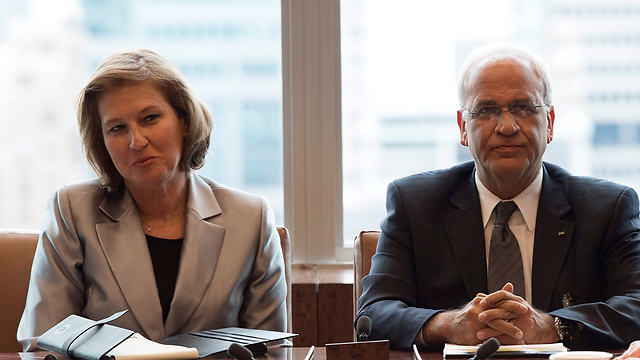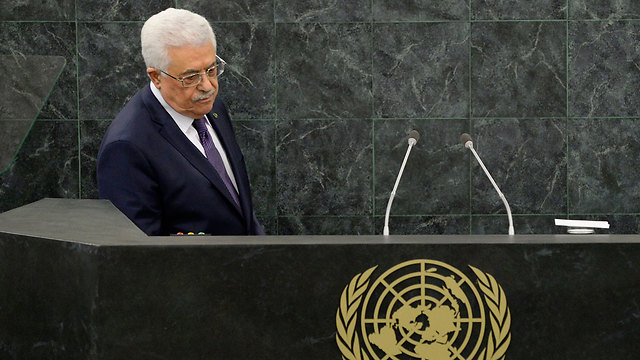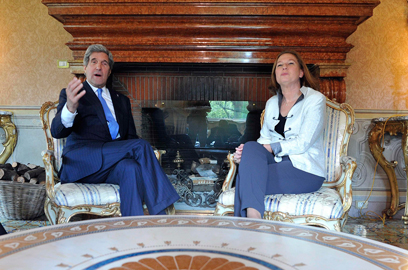
Israel says it is cancelling prisoner release
After Abbas signed letters of accessions to 15 international conventions, Chief Negotiator Livni says prisoner release cancelled, saying 'new conditions were established and Israel cannot release the fourth batch of prisoners.'
Israel's chief negotiator Tzipi Livni said Israel will not release the fourth batch of Palestinian prisoners because of the Palestinians' push for recognition at the United Nations.
Tzipi Livni's spokeswoman said Thursday that the government was working to finalize an agreement to free the prisoners when Palestinian President Mahmoud Abbas signed letters of accessions to 15 international conventions.

Livni said the prisoner release was contingent on the Palestinians refraining from making unilateral moves. Livni said that "new conditions were established and Israel cannot release the fourth batch of prisoners."
She added that now the sides need to re-examine how to proceed in the US-led talks helmed by Secretary of State John Kerry.
Kerry commented on faltering talks earlier Thursday, attempting to dispel claims that peace negotiations have reached a dead end: "The fight right now, the disagreement between them, is not over the fundamental substance of a final status agreement. It’s over the process that would get you there and what you need to do in order to be able to continue to negotiate.
"It would be a tragedy for both of them to lose the opportunity to get to those real issues that are the differences of a final status agreement."
Palestinian sources told Ma'an that a nine-hour meeting held in Jerusalem Thursday with US Special Envoy Martin Indyk, Chief Palestinian negotiator Saeb Erekat, head of Palestinian intelligence Majid Faraj, and Israeli negotiators Livni and Yitzhak Molcho ended without any signs of bringing both sides back to the negotiating table failed to yield results.
Related stories:
- Netanyahu: No prisoner release without quid pro quo
- Abbas refuses to discuss framework accord before prisoner release
- Palestinians publish new list of demands: PM must agree to East Jerusalem as capital
The sources, Maan reportedly described the meeting as a "fierce political battle", with Martin Indyk struggling to control heated exchanges between both sides.
Erekat reportedly told Livni that "we are here to negotiate in the name of the UN-recognized State of Palestine, not in the name of a Palestinian Authority whose inputs and outputs are controlled by Israel," to which the Israeli team responded by threatening to put "endless" sanctions on the Palestinians, the sources told Maan.
During the heated exchanges, Indyk reiterated his support for Israel's security, which prompted Faraj to stress that the Palestinians were there for "political, not security" talks and to negotiate about Jerusalem as the future capital of an independent Palestinian state.
Erekat then reportedly responded to Israeli threats of sanctions by saying the PLO would go after Israeli officials as "war criminals" in international institutions.
Carful defiance
When Abbas signed onto 15 international conventions on Tuesday, he shocked the US sponsors of troubled Middle East peace talks. But the move was carefully limited to avoid American retaliation, Palestinians claim.
Abbas's action may have been designed more as a symbolic act of defiance than a knife in the heart of peacemaking, in an attempt to shore up his tenuous standing among Palestinians frustrated at the diplomatic impasse with Israel over their goal of statehood
As a non-member state in the United Nations, Palestinians can join 63 international agencies and accords. However, by only signing conventions dealing with social and human rights instead of seeking full membership in UN bodies, the Palestinians' foreign minister said they would not provoke US sanctions.
"Frankly speaking, I don't expect any consequences coming from the US Congress regarding this step at all," Riad al-Malki told reporters on Wednesday.
"We did not talk about us becoming members of the UN specialised agencies in order for the Congress to activate their decision. We are talking about and we are still talking about letters of submission to protocols and conventions, and that's it."
Peace negotiations are near collapse amid mutual accusations of bad faith. In the latest such episode, Abbas inked the 15 conventions in search of more leverage against Israel after it refused to free a batch of Palestinian prisoners under terms of a previous agreement. Israel, in turn, said it would not release those detainees without a Palestinian commitment to continue negotiations beyond an initial end-of-April deadline.
US officials criticised what they called "unhelpful, unilateral actions" by both sides.
Reuters, Ynetnews and Yitzhak Benhorin contributed to this report












